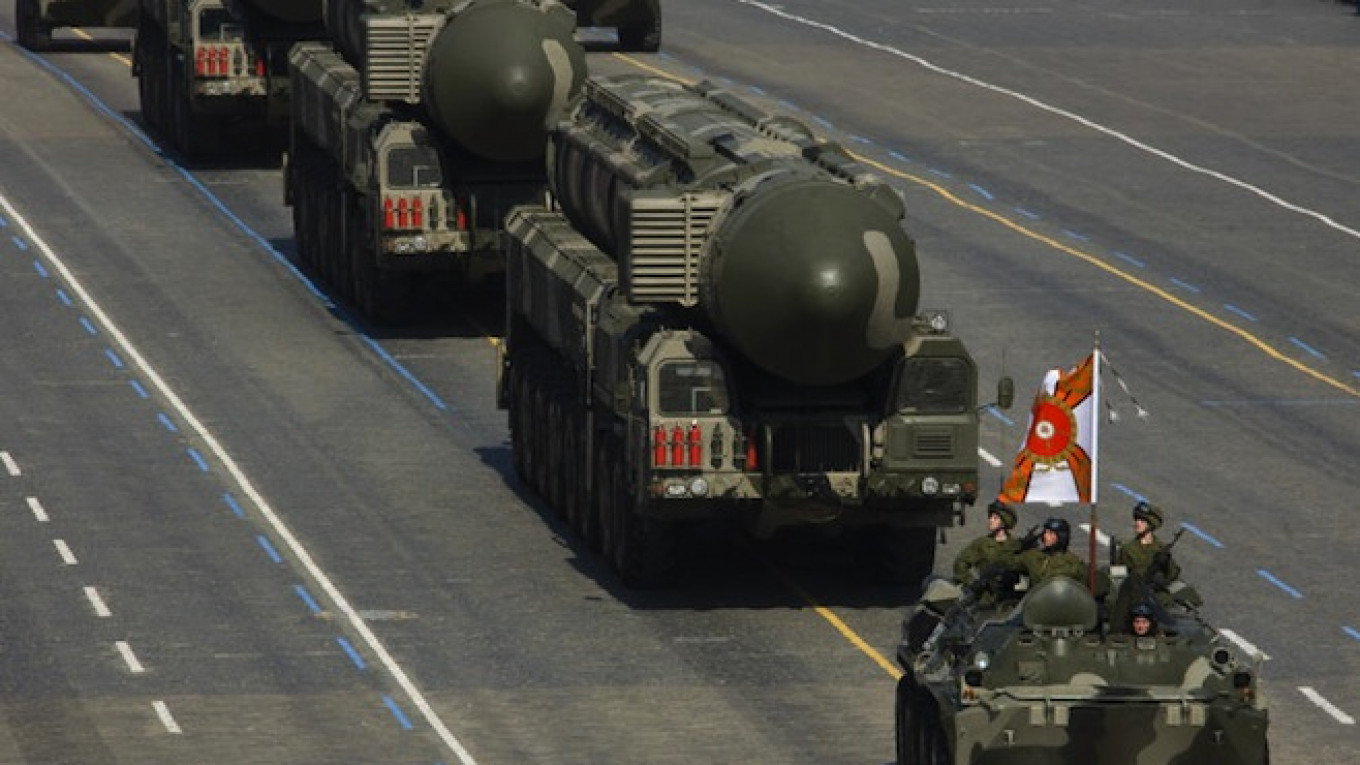Russia's defense spending is set to increase by a modest 0.8 percent next year, falling far short of the estimated 10 percent annual budget increases required over the next five years to hit equipment modernization targets mandated by President Vladimir Putin.
Russian military expenditure has been rising since 2011, when the government launched a massive 20 trillion ruble ($700 billion at the time) rearmament drive aimed at modernizing some 70 percent of the Russian armed forces by 2020. But amid an economic crisis that began last year, planned spending on the program has hit an apparent snag.
Going into this year, the State Duma budgeted around 3.3 trillion rubles ($52 billion) for defense. This figure was later curtailed by 5 percent, resulting in an actual 2015 military budget of just over 3.1 trillion rubles — despite the cut, a 26 percent increase in spending over 2014.
In 2016, the increase will be smaller. According to a draft of the 2016 federal budget, “the 2016 budget allocation for national defense is planned at 3.145 trillion rubles ($50 billion),” or about 4 percent of Russia's projected gross domestic product, news agency TASS reported Saturday.
Though this will put Russian military spending ahead of the United States' as a percentage of GDP, the 2016 U.S. National Defense Authorization Act is expected to stand at around $600 billion when approved.
Russia's 2016 budget marks the first time since 2011 that military spending will not drastically increase year-on-year. If the draft budget is approved, defense expenditure will rise by just 25.5 billion rubles ($400 million), or less than 1 percent, according to TASS.
Allocations for investment in infrastructure “for special and military purposes” will be reduced by 48.85 billion rubles ($775 million), but money for military salaries will increase by 40 billion ($640 million), the report said.
It was not clear how the changes will impact military operations such as the massive snap exercises and maneuvers seen since the start of the Ukraine crisis last year, or Russia's ongoing air campaign in Syria.
However, flat military spending is not likely to curtail Russia's intervention in Syria, which Moscow has presented as an anti-Islamic State campaign, but Western officials say is meant to prop up embattled Syrian President Bashar Assad.
That campaign, which features daily bombings by around 30 aircraft and military supply runs to Assad, has cost Russia anywhere from $95 to $140 million since bombing began on Sept. 30, according to data provided to The Moscow Times by defense consultancy IHS last week.
The TASS report did not specify how much of the proposed military budget would be dedicated to buying new military equipment, as mandated by Putin's 2020 rearmament and modernization program, but spending on new equipment is usually two-thirds of the budget.
This year, almost 2 trillion rubles ($32 billion) from the annual defense budget was allocated to military procurement, and IHS analyst Craig Caffrey told The Moscow Times in June that Russia would need to increase these expenditures by 10 percent every year in order to meet Putin's spending targets on new weapons.
If the overall defense budget is not raised, Russian spending on procurements of new weapons will likely remain flat — calling into question the government's ability to complete its 2020 program on time or in full.
However, the defense budget is one of the few items on the 2016 draft that have not been subjected to funding cuts, while funding for education, health care, and other social expenses are expected to be reduced.
"This signals that the Russian authorities are determined to keep the defense industry a priority, and possibly to rely on military leverage in Russian foreign policy in 2016," said Vadim Kozyulin, a military expert at the Moscow-based PIR Center think tank.
"The defense industry will be the last to feel the shortages of the shrinking budget," he said.
Contact the author at m.bodner@imedia.ru
A Message from The Moscow Times:
Dear readers,
We are facing unprecedented challenges. Russia's Prosecutor General's Office has designated The Moscow Times as an "undesirable" organization, criminalizing our work and putting our staff at risk of prosecution. This follows our earlier unjust labeling as a "foreign agent."
These actions are direct attempts to silence independent journalism in Russia. The authorities claim our work "discredits the decisions of the Russian leadership." We see things differently: we strive to provide accurate, unbiased reporting on Russia.
We, the journalists of The Moscow Times, refuse to be silenced. But to continue our work, we need your help.
Your support, no matter how small, makes a world of difference. If you can, please support us monthly starting from just $2. It's quick to set up, and every contribution makes a significant impact.
By supporting The Moscow Times, you're defending open, independent journalism in the face of repression. Thank you for standing with us.
Remind me later.


